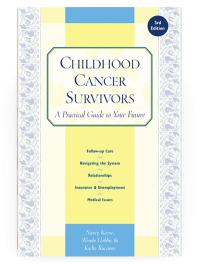Childhood Cancer Survivors
Nurturing your spirit
The mind and body are intertwined. Many survivors were raised to be tough, to soldier on through difficult and painful experiences. Not releasing strong emotions can cause all sorts of physical and psychological problems. It’s simply not healthy to try to stuff uncomfortable feelings deep inside. As one survivor remarked, “It’s like not taking the trash out. Pretty soon it starts to pile up and stink.”
Survivors, just like other people, need to recognize stress, anxiety, and depression and get appropriate help, if necessary. Some survivors find exercise, religion, reading, counseling, or spending time with other survivors to be a good way to reduce stress. Others need more intensive support and possibly medication. Seeking help is an action of an individual who has great strength and is willing to obtain whatever help is necessary for a healthy mind and body.
I take time to explore feelings rather than shove them into a back corner. It took me a long time to realize that it’s okay to be sad about it. I’ve had to learn to give myself permission to stand and look out the window for 15 minutes and cry because I’m scared of my future. Not everybody has a crystal ball put in front of them. For me, all my Hodgkin’s survivor friends are crystal balls. And I’ve seen too many of them die. To deal with that, sometimes I just need to sit with that feeling and be scared. I just need to drain out the emotion that’s absorbing every bit of my energy.
I try to see the positive side, too. Yes, it’s horrible to live with this hanging over my head, but there are people who get to the end of their life and have never lived. If I died tonight, nobody could say I didn’t really live.
• • • • •
I’ve really gotten into a mind/body/spirit approach to health maintenance and prevention of disease. I don’t need any more stress in my life. I can’t control outside influences and that’s hard. But I can control my eating, exercising, and relaxation. I’m the picture of health.
Some survivors find that writing about their feelings is very cathartic. Others talk to loved ones, get comfort from faith, or give back to the cancer community. Many start or join support groups for survivors of cancer.
Certain periods of life are harder than others. Survivors are sometimes surprised when intense feelings surface many years after treatment ends.
There are several things that I do to cope. First, I believe that laughter can boost the spirit. I watch cartoons rather than the news when I get home from work. Laughing hard is a big stress reducer. I try to regularly do fun, relaxing, and entertaining things.
I try to take breaks and work on non-cancer-related projects. I try to keep up with things that interested me prior to the cancer. It helps me to maintain my identity. I also write a lot—fiction, nonfiction, poetry. I really calm down when I express my emotions in my writing.
• • • • •
I went to therapy to learn how to get rid of the anger I’ve carried around for years. I really thought that when the cancer ended, the world would open up to me and everything would be great. I imagined that my life after cancer would be perfect. I have two beautiful healthy kids and a great husband. I thought, what’s the matter with me—why aren’t I happy? The therapy that I go to has been just fabulous.
• • • • •
One thing that I do for myself is try to give back to the cancer community. I was a co-leader of a cancer awareness group in college called “Students Striving Against Cancer.” For breast cancer awareness month we distributed ribbons and literature on campus. Next we’re planning some activities associated with the Great American Smokeout ® . We also help plan and participate in the Relay for Life. I’m also a counselor each year at the camp for kids with cancer and their siblings. I’ve been growing my hair ever since losing it twice 13 years ago, and just last week I had 12 inches cut off to send to a place that makes wigs for kids who have no hair. These are things that I need to do and I want to do. I feel like I’ve been given so much and I want to give back.
Although cancer may alter the lives of young survivors and their families, accepting that life is different allows them to move forward. Parts may be better, and parts may be worse. Surely, it is not what anyone in the family expected or wanted. But what is done with the new life is the important thing. Finding meaning in the altered circumstances and living life to the fullest can bring satisfaction and fulfillment.
Table of Contents
All Guides- 1. Survivorship
- 2. Emotions
- 3. Relationships
- 4. Navigating the System
- 5. Staying Healthy
- 6. Diseases
- 7. Fatigue
- 8. Brain and Nerves
- 9. Hormone-Producing Glands
- 10. Eyes and Ears
- 11. Head and Neck
- 12. Heart and Blood Vessels
- 13. Lungs
- 14. Kidneys, Bladder, and Genitals
- 15. Liver, Stomach, and Intestines
- 16. Immune System
- 17. Muscles and Bones
- 18. Skin, Breasts, and Hair
- 19. Second Cancers
- 20. Homage
- Appendix A. Survivor Sketches
- Appendix B. Resources
- Appendix C. References
- Appendix D. About the Authors
- Appendix E. Childhood Cancer Guides (TM)

